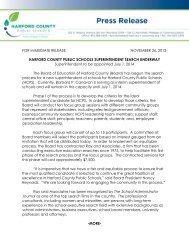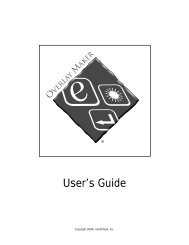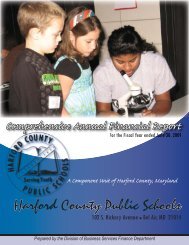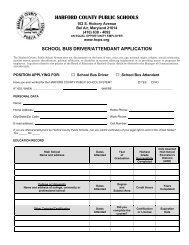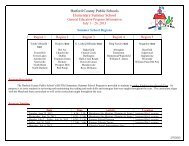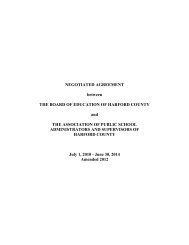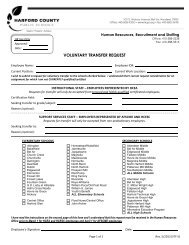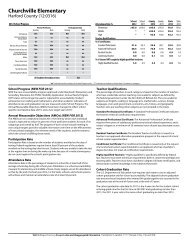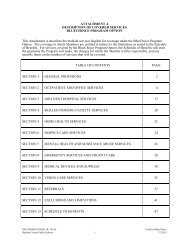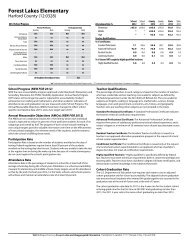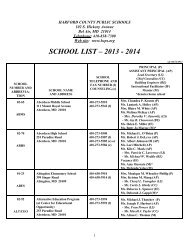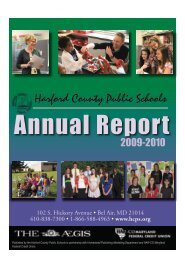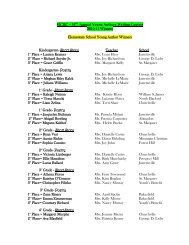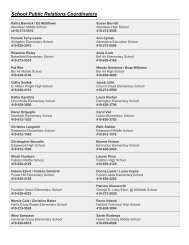Parent Handbook - Harford County Public Schools
Parent Handbook - Harford County Public Schools
Parent Handbook - Harford County Public Schools
You also want an ePaper? Increase the reach of your titles
YUMPU automatically turns print PDFs into web optimized ePapers that Google loves.
The Lead and Copper Rule required small water systems to complete initial monitoring of their drinking water supply by<br />
December 31, 1993. <strong>Harford</strong> <strong>County</strong> <strong>Public</strong> <strong>Schools</strong> has completed the initial testing and continue to meet the requirements as<br />
issued by the EPA. Those requirements include corrosion control, source water treatment, and public education for systems that<br />
exceed the action level of 15 parts per billion (ppb) or 0.015 milligrams per liter (mg/L).<br />
Results from testing done by <strong>Harford</strong> <strong>County</strong> <strong>Public</strong> <strong>Schools</strong> are on file in the administrative offices for the school system, and<br />
are available for inspection by the public. Regular monitoring of the drinking water continues. Any questions may be directed to<br />
410-638-4085.<br />
<strong>Parent</strong>/Community Involvement<br />
<strong>Harford</strong> <strong>County</strong> <strong>Public</strong> <strong>Schools</strong> invites and encourages the participation of parents/community in the education of their children.<br />
All parents and community members are expected to participate actively in program planning and decision making. Visit www.<br />
hcps.org for the full policy.<br />
Personal Property<br />
Personal property that is brought into the school by students is not covered under the insurance of <strong>Harford</strong> <strong>County</strong> <strong>Public</strong><br />
<strong>Schools</strong>. Please contact your homeowner’s insurance company regarding any valuable items, such as musical instruments, for<br />
off-premise coverage. Students/parents should evaluate the personal items that are brought to school. Also, students should take<br />
the time to permanently mark personal items so they are clearly identifiable. Personal computers are not permitted in schools.<br />
Policy For Instructional Grouping<br />
The school system does not favor any one pattern of instructional grouping for students. In fact, flexible grouping patterns within<br />
each school are encouraged in order to meet specifically identified student needs and to encourage the use of the most effective<br />
teaching methods and strategies. Each school has in writing a description of the grouping patterns used for its students.<br />
Policy For Internet Use<br />
<strong>Harford</strong> <strong>County</strong> <strong>Public</strong> <strong>Schools</strong> provides telecommunications resources to its students for educational purposes: the acquisition<br />
of information/resources, communications and collaboration with experts, and career development activities. Telecommunications<br />
resources shall be used in accordance with the educational goals of the school system.<br />
Student use of the resources provided shall be under the direct supervision of the teacher and shall be instructionally related.<br />
Reasonable precautions will be taken to ensure that the Internet is a safe learning environment for students. Students will be<br />
expected to demonstrate responsible and ethical behavior in the use of the resources.<br />
Access to the Internet through the telecommunications resources will only be granted to users who follow the <strong>Harford</strong> <strong>County</strong><br />
<strong>Public</strong> <strong>Schools</strong> Acceptable Use and Internet Safety Policy for Students and the procedures for such use. These policies are<br />
published on the HCPS website (www.hcps.org).<br />
HCPS utilizes an outside internet filtering company to ensure the safety of our students while they access the Internet. The use<br />
of this filter system also allows HCPS to comply with the Child Internet Protection Act (CIPA). Although the web filtering product<br />
utilizes the most innovative and cutting edge technology, it is still possible for students to access specific websites should<br />
students seek them with intention and purpose. Therefore, the only way a parent can be completely assured his or her child will<br />
not be able to access inappropriate material is to opt-out of Internet use at school. Your school can help you with this process.<br />
Preparedness Planning<br />
<strong>Harford</strong> <strong>County</strong> <strong>Public</strong> <strong>Schools</strong>, in cooperation with the <strong>Harford</strong> <strong>County</strong> Department of Emergency Preparedness, participates in<br />
planning for various types of emergency situations such as fires, natural disasters, air pollution, and utility disruption. In the event<br />
of any type of emergency that disrupts normal schedules at schools, notification will be provided through commercial radio and<br />
television stations. See page 13 for a complete list of notification procedures.<br />
Privacy Rights Of <strong>Parent</strong>s And Students<br />
Policy And Procedures<br />
Federal and State laws give students and their parents the right to inspect<br />
and review the student’s educational records and to have school record<br />
inaccuracies corrected. <strong>Schools</strong> have the responsibility to maintain the<br />
confidentiality of student records.<br />
Records shall be kept for individual students in accordance with rules and<br />
regulations of the Maryland State Board of Education.<br />
Individual student records maintained by teachers or other school<br />
personnel are to be confidential in nature, and access to such records may<br />
be granted in accordance with applicable laws and regulations. Individual<br />
student records, with the exception of such records as are designated as<br />
permanent, and with such other exceptions as provided by the law, should<br />
be destroyed when they are no longer able to serve such legitimate and<br />
recognized educational ends.<br />
All educational records of a student maintained under the provisions of the<br />
Code of Maryland Regulations (COMAR), including confidential records,<br />
shall be made available to eligible students, approved caretakers, custodial<br />
and non-custodial parents, or legal guardians except as otherwise provided<br />
herein.<br />
Definitions<br />
1. Directory Information - student’s name and grade, but only when<br />
it appears on honor roll or graduation list or as a member of a<br />
school-approved team, club, or other student organization or school<br />
publication; participation in officially recognized activities and sports;<br />
weight and height of members of athletic teams; degrees and awards<br />
received; student’s name and photograph as they appear in individual<br />
school or school system publications.<br />
2. Disclosure - permitting access, transfer, or release of educational<br />
records of the student.<br />
3. Eligible Students - a student who has attained 18 years of age or is<br />
attending an institution of post-secondary education.<br />
4. Local School Personnel - all officers, employees, and agents of the<br />
Board of Education of <strong>Harford</strong> <strong>County</strong>.<br />
5. <strong>Parent</strong>s - custodial or non-custodial parents or approved caretakers<br />
of the student may inspect the educational records unless the <strong>Harford</strong><br />
<strong>County</strong> <strong>Public</strong> <strong>Schools</strong> have been provided with a legally binding<br />
instrument that provides to the contrary. This includes a legal guardian<br />
or approved caretaker in the absence of a parent or guardian.<br />
6. Party - individual, agency, institution, or organization.<br />
7. Personally Identifiable - data or information including (a) the name<br />
of the student, his/her parents, and family members; (b) address;<br />
(c) social security number or student number; (d) a list of personal<br />
characteristics which would make it possible to identify the student<br />
with reasonable certainty; or (e) other information which would make it<br />
possible to identify the student with reasonable certainty.<br />
8. Post-Secondary Education - beyond grade 12.<br />
15



